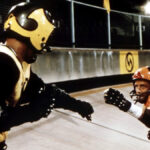The Human Landscape, by Tyler Smith
Of all the different film genres, the biopic is among the most troublesome. As directors attempt to tell the story of a great historical figure- a politician or an artist- they often opt for a “warts and all” approach, depicting the figure as a deeply flawed individual whose greatness overshadowed his inherent selfishness. To humanize an historical figure isn’t the worst instinct, but too often the filmmaker forgets to include those things that make us interested in the person in the first place.
Movies like Lawrence of Arabia and Patton sincerely depict the strategic greatness of these legendary military men, while also capturing their narcissism and pride. Capote and Pollock show brilliant, committed artists whose own self-centeredness would eventually be their downfall. These movies understand that we need to see both the positive and negative aspects of these people in order to respond to them as characters.
Mike Leigh’s Mr. Turner often feels like a typical “warts and all” biopic, albeit one that is wonderfully crafted. The depiction of painter J.M.W. Turner as an emotionally distant, self-absorbed monster would be a bit more acceptable if we were allowed access to either his method of painting or his motivation to do so.
Unfortunately, as a character, Turner is often impenetrable. In a very committed performance by Timothy Spall, Turner grunts and sneers at the people around him, never quite deeming them as worth his time or tolerance. The only real affection he shows is for his sweet-natured father, and, even then, this could have something to do with the fact that his father dotes on him and constantly reminds Turner of how special he is. Turner has other family- several daughters, in fact- but he barely acknowledges that they exist. We don’t really know what drives this man, but we certainly know that we don’t like him.
We do see some of Turner’s finished paintings, and occasionally see the process in which they are created, but Leigh doesn’t linger long on that. This frustrated me immensely, and I started to wonder why Leigh even wanted to make this film. For a while, it seemed like he was simply committed to exposing the horrendous personal life of J.M.W. Turner and nothing else.
However, as the film continued, I started to feel like this isn’t a film about Turner’s art so much as it is about his engagement with art, and perhaps the art world itself, and the way that informs his relationship to others. While Turner doesn’t have a great deal of affection for those around him, he always seems to respect those with talent and artistic ambition. We rarely see him smile, except when faced with beauty, whether it be a gorgeous sunset or a quiet piano piece. It would appear he doesn’t have the patience for much else.
Turner is also very entrenched in the art world, where he is accepted as a genius and praised for his work. He walks among his fellow artists as a sort of king, expressing approval and disapproval at his leisure. More unconventional painters appeal to him for his blessing (and an occasional loan) and he looks at them with disdain. Because, while he does appreciate beauty, he is also quite set in his ways and has grown quite used to being a part of the art establishment.
But, soon, the time comes when Turner’s own artistic indulgences start to diverge from the norm and he soon finds himself ostracized and mocked by the very world that at one time embraced him. As this happens and Turner comes to realize that he can no longer define himself the way he used to, he softens a bit. He is more generous and encouraging to others. He comes to regret the way he has treated his family, and perhaps humanity in general. Art used to be the only thing, but it soon came to reject him (in a sense), and he is forced to reassess his values.
Ultimately, Mr. Turner ends up being an important part of Mike Leigh’s filmography. Leigh has specialized in making films about people that feel estranged from one another, desperate for connection, but unable to get past their own flaws. Turner is certainly one of these people. And while Leigh’s other characters tend to be excessively talkative, Turner chooses to express himself in different ways. But, in the end, he comes to realize- as Leigh’s characters eventually do- that there is always the possibility of hope and redemption.
Mr. Turner is an incredibly beautiful film. At first, it is only a visual marvel, as we see the world as Turner must have, with the sun shimmering the sea and the fields appearing as vast as the ocean, but soon the beauty takes on an emotional quality, as well. As sweeping and unknowable as Turner’s landscapes are, they are nothing compared to his fellow man, whose complexity and potential can be just as staggering as anything in his paintings.































